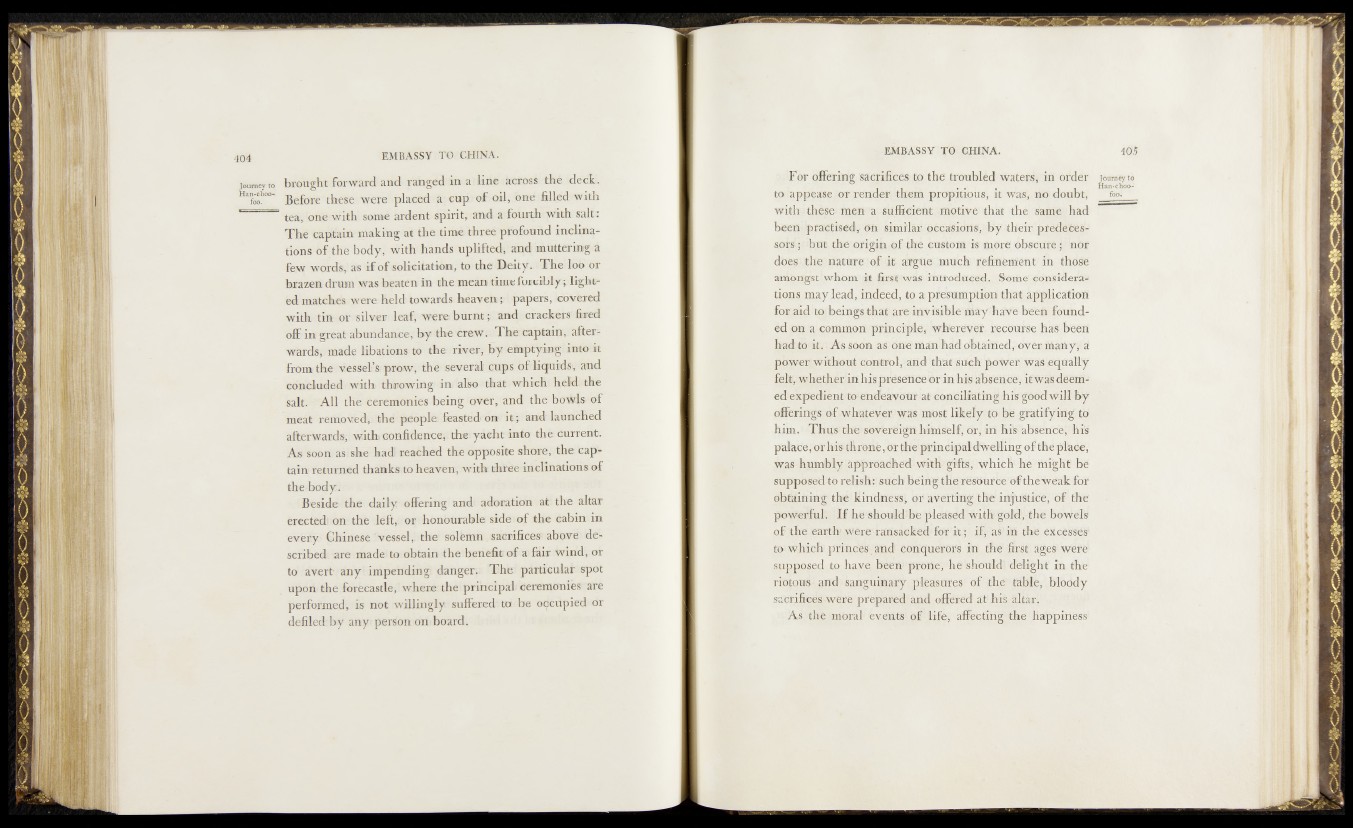
Journey tc
Han-choo-
foo.
brought forward and rafagedsin a< Miifc across the deck.
Before these were placed a cop of oil, one filiedwrith
tea* oifo with sen* ardent spirit, and a fourth With salt :
The captain making at the time three ptofoniid inclnaa-
ttons Of the body, with hands uplifted, and Muttering a
few weands^a® i f of solicitation, to the Beaty, The lob or
brazen drum was beaten in the mean time forcibly; light*
ed matches were held towards heavens;: papers, covered
with tin or silw® leaf, were burnt; and crackers’ lured
off iffi^rmt?kbtmdaiicev by the erew. Tke; captain,.afterwards,
made libations to the river, by emptying intork
from the vesselfs; prow; the several cups
concluded with throwing in ah® thatwhich: §iilid;>febe
salt. “A ll the ceremonies being over, and the-: boWls of
meat removed», the people: feasted on it; and launched
afterwards,, with confidence;, the yacht into -the Current.
As soon ass she had! readied the opposite shore, the captain
returned thanks-to heaven , with three inclinations of
the body.
Beside the- daily offering andt adoration atJthe altar
erected) on1 the left,, or honourable side of the cabin in
every- Chinese vessel, the solfemn sacrifices above de;-
scribed. are made to obtain the benefit) of a' fair Wind, or
to avert any? impending danger.; The particular spot
upon the .forecastle; where the. principal ceremoniesrare
performed, is not willingly sufferedttr be occupied dr
defiled: by any' personon i board.
‘'-Tor offering sacrifices to the troubled waters, m ó ed e r jértrn^#
to'appease 'Of render them propitious, it Was, no <foubt, fife
with i these: men a sufficient mbtivê^fhat the same had
beeurpractisedv Oft similar occasion®, Bystfcfeir predecessor
®; but the origin <of the custom is more obscure f 'nor
does i;the - iiature ofoig aifgüe much? refinèüïen-t' in those
amongst'whom it ■firs'fwas'introduced. Some1 -éónSMeraV
tions.may lead, ind.eed, a presumption- that application
for add to beings th a t atednYisible m2ySti$tfb béfen founded
on a common? principle,- wberdVCf recmwSe; has been
had tO'it. * As Soon aS- óne' man had obtained,-'Over- fta k y ,* a
P ^ ^ l l ^ i th o u t control, afld that such power wasetpiall’y
felt, whether' in h isp fësemèëw i n his absence,- ifrwate deem-
edïexpediénÈ’t)0, endeavour at conciliating hi& góod will by
offerings-@f-whatever Was most likely‘to be gratifying to
him. THus?ehi#siTOrë^ö hitósfelfi or, iii hfe%bSen5e^|liiS
palace, or hi® tn rótte ,or th eprinCip al dwelling or th é pfeéè,
Was h^mMy*approachéff'with gifts,^Whicfr he might be
supposed to relish:’ siïeb being the rësburce óf the%eak for
ObtÖiniwg' the MitidöeSsi 0 # the injustice, o f the'
powerful. I f he should be pleased Witk'gdM», the bowel#
o f the eart'h» Wérë'raösacfeed fof- i t ; if-^ai3 in the éxc'ésSeS
toI w h ich ptittdes*- and concfuerors in the’ first ageS were
supposed to have been» protte^he should* delight' in the’
riotous- and'sanguinary plfeasttres! o f;st>he'table, hfeödy
sacrifices-were prepared and offered a t his altar.
As the moral events of life, affectihg-the’happiness5